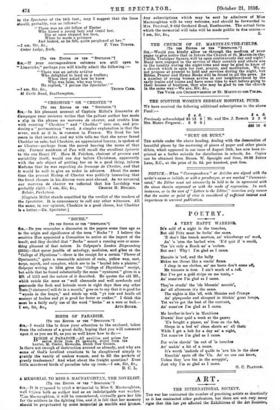"BOCHE."
[To THE EDITOR OF TEl "Brzeriroa.1 ill a,—Do you remember a discussion in the papers some time ago as to the origin and significance of the term " Boche "? I believe the sensitive Hun appointed a Committee to arrive at the import of the insult, and they decided that " Boche" meant a running sore or some- thing pleasant of that nature. In Culpeper's London Dispensatory (1654)—that queer jumble of astrology, medicine, and gibes at the "College of Physitions"—there is the receipt for a certain "Flower of Oyntmonts," quite a reasonable mixture of resin, yellow war, suet, turps, myrrh, and camphor, which are to be " boyled into a plaister." Culpeper writing in 1654 gives the "College of Physitions" receipt, but adds that he found substantially the same " oyntment " given in a MS. of 1513 and the nature of it described. He quotes the old MS., which extols the mess as "well elensande and well sowdonde and geaerande the flesh and helonde more in eight days than any other Vete [? ointment] will do in a month," goes on to say that it is good for " wynde in the brayn," and winds up with "yt rots and healls all saannyr of bodies and yt is good for fester or conker." I think this fault be a fairly early use of the word " boche" as a sore or boil.--


































 Previous page
Previous page